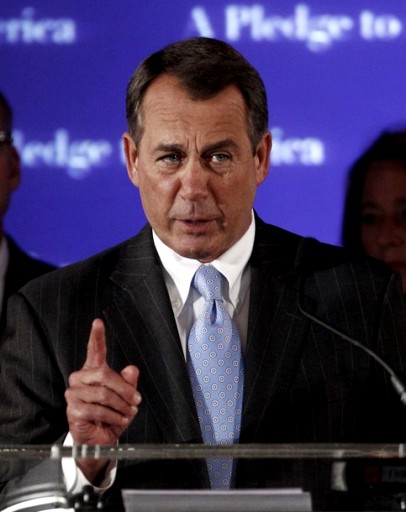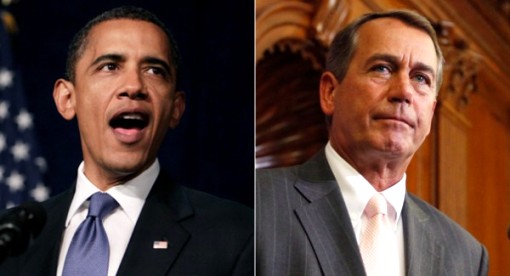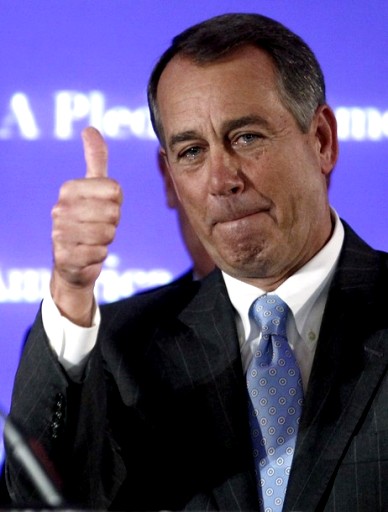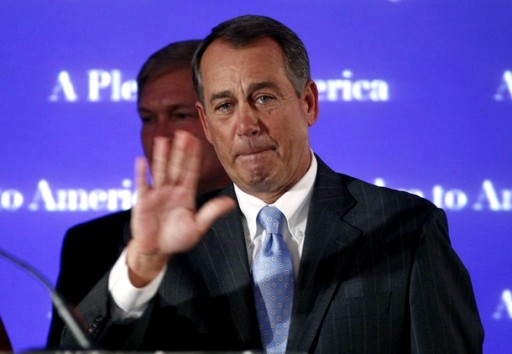
- U.S. House Minority Leader John Boehner (R-OH) addresses a Republican election night results watch rally in Washington, November 2, 2010. (Getty Images / REUTERS/Jim Young )
November 02, 2010 Washington (KATAKAMI / CNN) -- Republicans rode a wave of voter dissatisfaction with the state of the economy to win majority control of the U.S. House of Representatives in Tuesday's midterm elections, while Democrats were poised to retain their majority in the Senate.
With results still coming in and voting continuing in Western states, the extent of the Republican takeover of the 435-member House was still to be determined. But CNN projected that Republicans would win at least 52 more House seats than they currently hold to wipe out the Democratic majority of the past four years.
At 11 p.m. ET, CNN made more projections in this game-changing election.
Projections are based on CNN analysis of exit poll data:
-- Republican businessman Ron Johnson has won the Wisconsin Senate race, ending Democratic Sen. Russ Feingold's bid for a fourth term.
-- Democratic incumbent Sen. Ron Wyden has won his bid for re-election to his Oregon Senate seat, beating out Republican nominee Jim Huffman.
-- Republican incumbent Sen. Mike Crapo has won his bid for re-election to his seat as Idaho senator.
-- In a heated gubernatorial race, Republican Nikki Haley has defeated Democrat Vincent Sheheen in South Carolina.
Republican candidates also were running strong in other governors' races, while Democrats held on to some key Senate seats and appeared likely to stay in control of that chamber.
An energized conservative electorate, fueled by the anti-establishment Tea Party movement that emerged in 2009, helped Republicans to what could be their biggest gain in congressional elections in decades.
Tea Party-backed Republicans Rand Paul in Kentucky and Marco Rubio in Florida won their Senate races, while another GOP candidate, John Boozman, will defeat incumbent Democrat Blanche Lincoln in Arkansas, according to the projections based on CNN analysis of exit poll data.
In Indiana, conservative Republican Dan Coats was the projected winner to take over the Senate seat held by retiring Democrat Evan Bayh. The projected victories by Coats and Boozman and John Hoeven in North Dakota gave Republicans three pick-ups in the Senate.
However, Democrat Chris Coons was the projected winner over Republican Christine O'Donnell, another Tea Party-supported candidate, in Delaware's Senate race for the seat formerly held for decades by Vice President Joe Biden. In Connecticut, Democratic Attorney General Richard Blumenthal will defeat Republican Linda McMahon, the former professional wrestling executive, for the Senate seat held by retiring Democrat Chris Dodd.
Another big Democratic victory came in West Virginia, where Gov. Joe Manchin was projected to win the Senate seat formerly held by the late Democratic Sen. Robert Byrd, who died earlier this year.
Other projected winners included incumbent senators such as Republicans Jim DeMint in South Carolina, Richard Shelby in Alabama, Tom Coburn of Oklahoma, John McCain in Arizona, David Vitter in Louisiana, John Thune in South Dakota, Richard Burr in North Carolina and Johnny Isakson of Georgia, along with Democrats Patrick Leahy of Vermont, Barbara Mikulski of Maryland, and Kirsten Gillibrand and Charles Schumer of New York.
The projected victories by Coons, Manchin and Blumenthal were vital for the Democrats' chances to retain their majority in the Senate.
Republican Rob Portman, the former budget director under President George W. Bush, will win his Ohio Senate race to fill the seat held by retiring Republican George Voinovich, according to the projections. In New Hampshire, the GOP's Kelly Ayotte is the projected winner to fill the Senate seat held by retiring Republican Judd Gregg.
On the House side, Republicans picked up seats in a broad swath across the country, including victories over one-term Democrats who came to power in traditionally GOP districts in 2008, leading Republican National Chairman Michael Steele to tell CNN that he expected his party to gain 55 House seats to take majority control of the chamber.
Both Paul, the son of Rep. Ron Paul of Texas, and O'Donnell rode Tea Party support to defeat mainstream Republican candidates in their GOP primaries.
Paul's projected victory to claim the seat held by retiring Republican Sen. Jim Bunning showed the influence of the movement that emerged in 2009 in opposition to expanded government and the growing federal deficit.
At the same time, the loss by O'Donnell could badly hurt Republican chances to win majority control of the Senate. Many Republicans believed the veteran congressman whom O'Donnell beat in the primary, former Gov. Mike Castle, would have defeated Coons.
Another Tea Party backed candidate, Republican Carl Paladino, will be handily defeated by Democrat Andrew Cuomo in the New York governor's race, the projections show. In other gubernatorial contests, Republicans Bill Haslam in Tennessee, Sam Brownback in Kansas, Rick Perry in Texas and Nikki Haley in South Carolina will be victorious, according to the projections.
Exit poll data analyzed by CNN showed the economy was the dominant issue on the minds of voters, and indicated that key constituencies shifted from supporting Democrats in 2008 to voting for Republicans this time.
For example, senior citizens who comprised 24 percent of the total electorate supported Republicans much more strongly on Tuesday than they did two years ago, the exit polling showed. According to the data, 39 percent of senior citizens voted for Democrats, compared with 49 percent in 2008, while 58 percent supported Republicans, compared with 49 percent two years ago.
One reason is likely opposition to the health care reform bill pushed through Congress over Republican opposition by President Barack Obama and Democratic leaders. While Obama pledged the reforms would improve Medicare, Republican opponents warned of service cuts and higher costs, with some making false claims such as "death panels" in the bill that would decide whether the elderly receive treatment.
Heated campaigning continued to the last minute on Tuesday, with President Barack Obama and former President Bill Clinton exhorting Democrats and independents to hold off a Republican surge while GOP candidates promised to change how Washington operates.
While Democrats continued to offer upbeat assessments of their party's chances Tuesday, multiple senior Democratic sources said privately they expected to lose their House majority just four years after taking control of the chamber.
Later Tuesday, senior Democratic officials with close ties to the White House expressed concerns that the first wave of early exit polling data suggested women voters, a key Democratic constituency in 2008, might not have turned out as strongly this time.
In addition, the officials said they have seen data suggesting that senior citizens may have come out in large numbers to express displeasure with health care reform, which they characterized as a troubling sign for the party.
The long and bitter campaign season drew more than $3.5 billion in spending, making it the most expensive nonpresidential vote ever, according to the nonpartisan Center for Responsive Politics, a watchdog group.
With about 100 of the 435 House seats at stake considered "in play," or competitive, an anti-Democratic mood had been predicted to result in big Republican gains.
On the Senate side, where 37 of the 100 seats were contested, the majority will be decided by key races in Nevada, Washington and a few other states where Democratic incumbents face strong challenges.
Republicans needed to win an additional 39 seats to claim the House majority and 10 Senate seats to overtake Democrats there.
If a Republican landslide occurs, it could surpass previous major shifts in congressional voting, such as the GOP's 56-seat gain in House seats in 1946.
In addition, the rise of the Tea Party movement added a new element to the election cycle, roiling Republican races by boosting little-known and inexperienced candidates to victory over mainstream figures in GOP primaries across the country.
No matter how many of the so-called Tea Party candidates win against Democratic opponents Tuesday, the influence of the movement has shifted the Republican agenda to the right.
"They tell me they want people who can work together in Washington," DeMint, one of the leading backers of Tea Party candidates, said in his victory speech. "I tell you this: I'm ready. I'm ready. Anyone whose guide is the constitution and whose goal is limited government, I'm ready to work with them today. But I'm not going to compromise with anyone who doesn't believe in that."
Exit polling showed voter dissatisfaction with both parties, as each received a 53 percent unfavorable rating. The economy was rated the most important issue by 62 percent of voters, far eclipsing health care reform (19 percent), immigration (8 percent) and the war in Afghanistan (7 percent), according to the exit polling.
Most voters, 88 percent, rated economic conditions as not good or poor, and 86 percents said they were very worried or somewhat worried about the economy, the exit polling showed.
Obama's approval rating was 45 percent, while 54 percent disapproved of his presidency so far, the exit polling revealed. Those figures were similar to the ratings for his two predecessors -- George W. Bush and Clinton -- who both saw their parties lose control of the House in the first mid-term election after they took office.
In a signal that Democratic campaign messaging was reaching voters, the exit polling showed 35 percent of voters blamed the nation's economic woes on Wall Street bankers, while 29 percent blamed Bush and 24 percent blamed Obama.
Voters across the country offered a variety of reasons for their choices Tuesday.
In Wolfeboro, New Hampshire, restaurant manager and internet entrepreneur Stephen Smith, 40, went to the polls hoping "that the entrenched incumbents get booted out of office," he said.
Melissa Bacon, 24, of Sacramento, California, cast her ballot partly for the thrill of the experience, she said.
"You don't get to vote every day. It's sort of its own holiday. You research the issues, vote and then wait to see if your position was the majority. It's as exciting to me as the World Series last night," she said on the heels of the San Francisco Giants' victory.
Nadya Alvarez of Parrish, Florida, went to the polls with her son to teach him about the importance of voting.
"My youngest is almost 2 years old, and I showed him the ballot, and he wanted to help fill in the circles," said Parrish, 28. "It is good to teach them from an early age to be involved in the welfare of our country and that we all have rights and duties to preserve."
Unemployment -- at a rate of 9.6 percent amid a slow recovery from economic recession -- has been the dominant issue, with Republicans accusing Obama and the Democrats of pushing through expensive policies that have expanded government without solving the problem.
Obama has led Democrats in defending his record, saying that steps such as the economic stimulus bill and auto industry bailout were necessary to prevent a depression, while health care reform and Wall Street reform will lay the foundation for sustainable future growth.
Observers warned that the expected Republican gains offer little chance of compromise or bipartisan approaches on major issues.
Ohio Republican Rep. John Boehner is expected to be the new House speaker if the GOP wins control of the chamber. He already has signaled little appetite to negotiate with the White House or congressional Democrats, saying last week that "this is not a time for compromise."
Boehner and other conservatives say the top priorities must be spending cuts to try to balance the budget and job creation to spur the economy. However, they also advocate extending Bush-era tax cuts for everyone at a cost of $4 trillion over the next decade.
In the Senate, legislative gridlock is likely if Republicans strengthen their current minority of 41 seats. Obama and Democrats accuse Senate Republicans of using obstruction tactics as a political tool, showing the distrust and animosity that already exists.
Democrats are also wary of a recent comment by Senate Republican Leader Mitch McConnell, who told the National Journal, "The single most important thing we want to achieve is for President Obama to be a one-term president."
The first test of a new relationship will come in mid-November, when Congress convenes a post-election lame-duck session to try to clear unfinished legislation before the newly elected Congress gathers in January. Among other issues, lawmakers must decide whether and how to extend Bush-era tax cuts.
(MS)

















